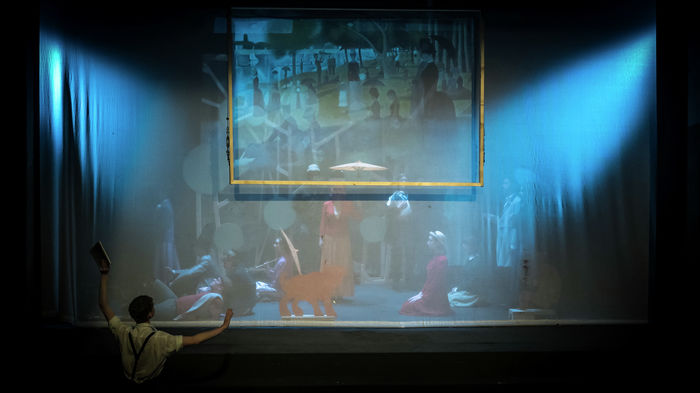Send in the crowds to see ‘A Little Night Music’
This well-directed and beautifully costumed production preserves all the charm of the emotionally and musically complex Sondheim classic

A Little Night Music is a delightful and uplifting night of, well, music. This revival of Stephen Sondheim and Hugh Wheeler’s 1973 musical boasts some incredible vocal and instrumental performances all around. Director Alex Wrathall’s smart handling of the show’s strong source material is sure to impress and uplift, as will the sheer amount of talent on display in this charming production.
A Little Night Music sees relationships interweave and entangle between members of upper-to-middle class Swedish society in the early 20th century. Eighteen year old Anne (Rowan Ibbotson) has been married to the much older Frederik Egerman (Andrew Gewecke) for almost a year. Frederik reconnects with his ex-fling, the wildly successful actress Desiree Armfeldt (Tabitha Tucker), herself entangled with the unhappily married Count Carl-Magnus Malcolm (Tel Chiuri). The social standing of the characters is here well conveyed through costuming — innocent, virginal Anne wears whites and baby blues, and the Count’s wife Charlotte, scorned and world-weary and wealthy, contrastingly wears deep red tones.
“Every song is catchy, beautifully melodic, and excellently performed”
Wrathall’s production makes no attempt to modernise Sondheim’s original setting, which sees all its characters in beautiful period-appropriate costume — not that this is any loss to the show, which nonetheless strikes one as relatable and life-affirming across the leaps of time and location between 20th-century Sweden and its 2023 audience. The strong, emotive performances of its ensemble cast ensure that its modern audience sees past the attire of the distant past, encouraging empathy with the universal human struggles with love and lust the characters undergo.
Tucker commands an incredible stage presence as the graceful and larger than life Desiree, humanising a character who might otherwise come across as a little too ‘wonderful’ (to quote one song). Her performance makes Desiree’s struggle with what is essentially a 1900s situationship a compelling one that will be relatable for many in the audience. Tucker has a distinct vibrato in her singing performance which highlights her character’s talent with its metatheatrical extravagance.
The actors play off each other to great effect, especially Chiuri and Gewecke, whose scenes have some hilarious physical comedy as they vie for Desiree’s affections. In particular, the song ‘It Would Have Been Wonderful’ sees the two grow physically closer as the song progresses, telegraphing their similarity; a later scene sees Gewecke, pathetically wounded, carried back on stage on Chiuri’s shoulder to the delight of the audience as his powerful status is upended.
"Preserves all the charm of this classic musical"
Wrathall’s staging of the show within the Trinity Hall Lecture Theatre’s limited space was particularly impressive. They made good use of the natural division between the raised stage and the ground to create different ‘rooms’ for their cast to inhabit, and the changes in location conveyed through rearranging set pieces made the homes of the characters feel distinct and personal. One strong scene sees all the characters sit down together for dinner, cleverly arranged in a tableau that communicates their shifting loyalties and affections toward each other.
I thought that more could have been done with the Quintet, five cast members meant to resemble a Greek Chorus, who open the musical and reappear throughout. All of these appearances were limited to the group coming to the front of the stage and singing to the audience, which felt jarringly static, breaking the flow of action in the play. The Quintet individually all performed very strongly but it didn’t feel like the director knew what to do with them.
I was constantly in awe of the band’s performances. Performing Sondheim’s complicated music live is no small feat, no less so when you are tailoring the performance to match the pace of the actors on stage. At one point, the actors briefly fell out of sync with the musicians who deftly readjusted the tempo to correspond again. Unfortunately, the actors frequently had to compete with the band to be heard — some cast members clearly struggled to project over the score being played during their scenes, which resulted in some lines being entirely inaudible. But you can’t exactly ask a big band in a small space to play quieter, and this is clearly something out of the production’s direct control.
The live music contributes enormously to the production — every song is catchy, beautifully melodic, and excellently performed. A Little Night Music is a truly special evening. The show is by no means a novel interpretation of its source material but the incredible competence with which it is executed preserves all the charm of this classic musical. It is a delightfully uplifting show to start off your week with.
A Little Night Music is playing at the Trinity Hall Lecture Theatre from Sunday 26th to Tuesday 28th February, 7pm.
 Features / Should I stay or should I go? Cambridge students and alumni reflect on how their memories stay with them15 December 2025
Features / Should I stay or should I go? Cambridge students and alumni reflect on how their memories stay with them15 December 2025 News / Cambridge study finds students learn better with notes than AI13 December 2025
News / Cambridge study finds students learn better with notes than AI13 December 2025 News / Dons warn PM about Vet School closure16 December 2025
News / Dons warn PM about Vet School closure16 December 2025 News / News In Brief: Michaelmas marriages, monogamous mammals, and messaging manipulation15 December 2025
News / News In Brief: Michaelmas marriages, monogamous mammals, and messaging manipulation15 December 2025 Comment / The magic of an eight-week term15 December 2025
Comment / The magic of an eight-week term15 December 2025









